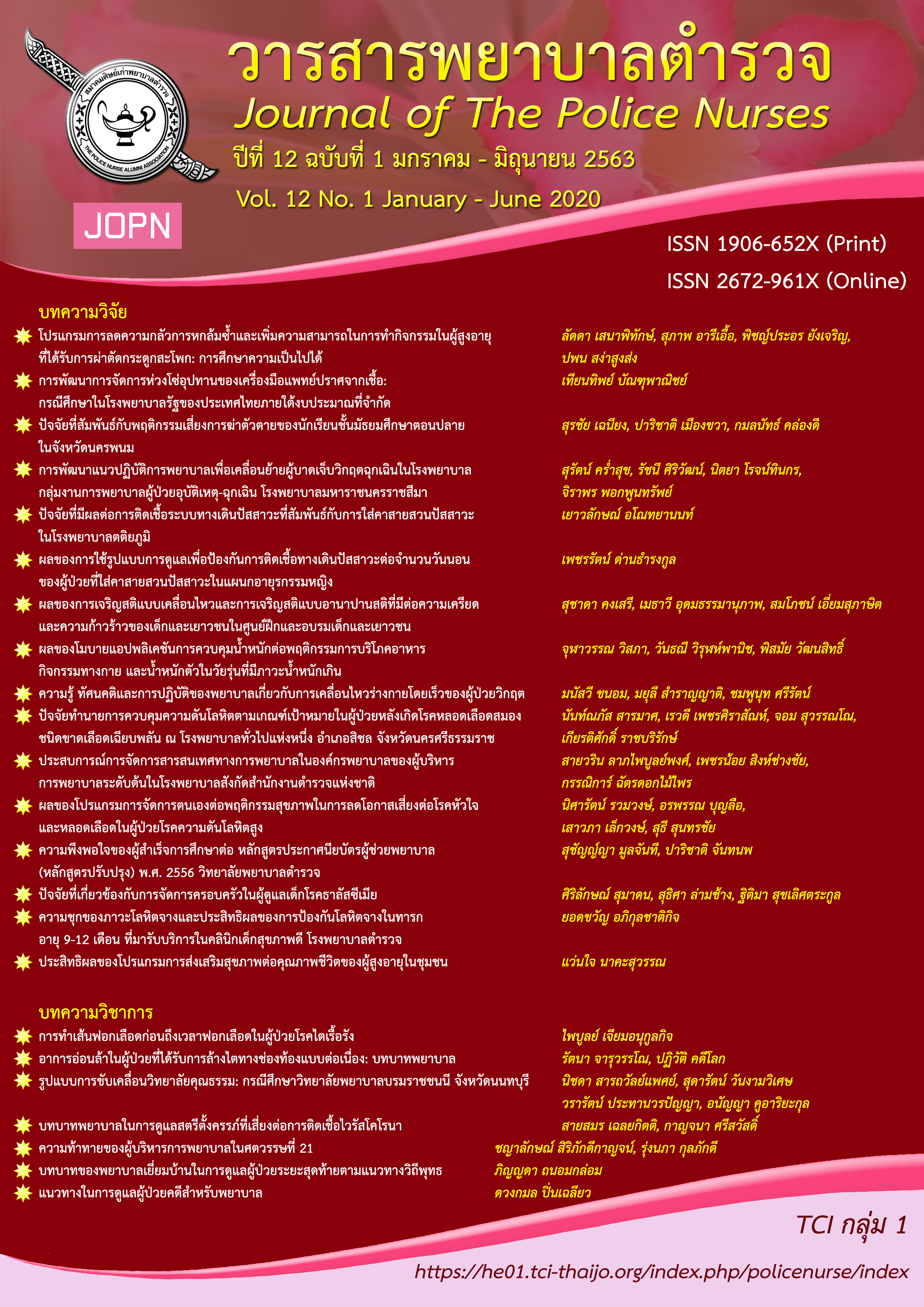THE DRIVING MODEL OF A MORAL COLLEGE: A CASE STUDY OF BOROMARAJONANI COLLEGE OF NURSING, NONTHABURI
Keywords:
moral college, driving modelAbstract
Promoting moral and ethics in the organization plays an important role for people to be able to happily live together. Boromarajonani College of Nursing, Nonthaburi is under Praboromarajchanok Institute, Ministry of Public Health that produces and develops nursing graduates having a professional identity. Boromarajonani College of Nursing, Nonthaburi had driven “the moral college project” following the MOPH core value and four moral identities, including sufficiency, discipline, honesty, and voluntarism together by using the Foundation of Virtuous Youth guideline and the Deming cycle (PDCA) in the organization. The driving model of moral college had changed attitudes and behaviors in the moral aspect together with the development of the task quality and the creation of the moral and ethical networks. The driving model of the moral college consisted of 1) having the moral college policy, 2) setting a committee of the moral college,
3) determining and announcing the moral identity, 4) providing the participation of staffs, and 5) continuously developing the action plan of the moral college. The objective of this article is to present an operating model of the moral college that can be a graceful guideline for driving a concrete moral college.
Downloads
References
Benjathikul, T. (2014). The ethics development model for school administrators. Phranakhon Rajabhat Research Journal Humanities & Social Science, 5(1), 81-94.
Boonpradit, K., Hamtanon, S., & Wattanasrisin, J. (2016). Promoting moral responsibility for the nursing student of Boromarajonani college of nursing, Nakhon Si Thammarat. Nursing journal of the Ministry of public Health, 26(1), 16-26.
Chuennirun, S. (2017). Morality and ethical reinforcement in public organization. Academic journal of Mahamakut buddhist university Roi et campus, 6(2), 216-224.
Foundation of Virtuous Youth. (2017). School of morality. Bangkok: Foundation of Virtuous Youth.
Jutarosaga M, Jutarosaga A. (2016). Reflective thinking: Creative systems thinking by 3 baskets. Bangkok: Danex intercooperation.
Kaypan, A., & Narongraksakhet, I. (2014). States, problems and inculcation of islamic ethics and morals in student at secondary school, Satun province. Al-nur jounal, 9(17),130-141.
Ministry of Public Health. (2016). Moral strategic plan of Ministry of Public Health for 2560-2564. Nonthaburi: Kaewkulaya Sikalai.
National Bureau of Economic and Social Development. (2017).The twelve national economic and social development plan. Retrieved From https://data.opendevelopmentmekong.net/dataset/12/resource/221befc53058-402a-9d31-279ac5bba4ec?inner_span=True
Nation moral promotion committee. (2016). The first national moral promotion master plan 2016-2021. Retrieved From http://www.mfa.go.th/acc/contents/files/other-20180719-160433-889866.pdf
Office of the Education Council. (2017). Nation education plan 2017- 2036. Retrieved From http://www.lampang.go.th/public60/EducationPlan2.pdf
Onsri, P. (2014). Contemplative education: Education for human development in 21st century. Journal of The Royal Thai Army Nurses, 15(1), 7 – 11.
Panyaphalo, B. (2012). Impacted factors toward virtue and morality of students at Siam technology college in Bangkok Yai district Bangkok (Thesis). Mahachulalongkornrajavidyalaya University. Bangkok. Retrieved from http://oldweb.mcu.ac.th/site/thesiscontent_desc.phpct=1&t_id=932
Skulpunyawat, S. (2014). Supervision by the caring behavior. Journal of The Police Nurses, 6(2), 200–208.
Thanman, S. (2019). Morality strengthening in 21st century, for organization of digital economy. Valaya alongkorn review (Humanities and Social science), 9(1), 146-162.
The Secretariat of The Senate. (2017). Constitution of the kingdom of Thailand. Retrieved From, http://library.senate.go.th/document/Ext22984/22984829_0002.PDF
Downloads
Published
How to Cite
Issue
Section
License
ผลงานที่ได้ตีพิมพ์แล้วจะเป็นลิขสิทธิ์ของวารสารพยาบาลตำรวจ















